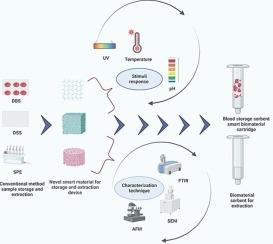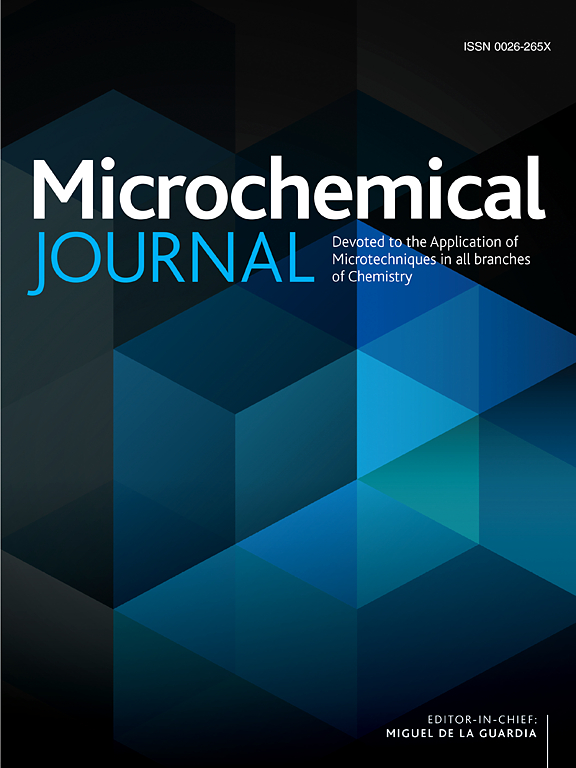用于储存和提取生物分析样本的新一代智能生物材料:现状与未来之路
IF 4.9
2区 化学
Q1 CHEMISTRY, ANALYTICAL
引用次数: 0
摘要
智能生物材料能够根据需要改变其固有特性,因此在生物分析科学领域的重要性与日俱增。最近,固态生物样本存储技术取得了许多进展。其中,干血斑和干血浆斑法作为最先进的方法具有独特的优势。然而,这些方法只能容纳极少量的样本。为了克服这一限制,人们正在广泛探索应用智能生物材料来储存和提取生物样本。本综述的主要重点是评估智能生物材料在生物分析样本的储存和提取方面的潜力。本综述对生物材料作为吸附剂用于生物分析样品提取和储存的适用性进行了严格评估,强调了生物材料的独特性质、表征技术和限制因素。此外,还讨论了生物材料在组织工程、药物输送和三维打印方面的应用,展示了生物材料在应对医疗保健领域关键挑战方面的潜力。本综述清晰地揭示了智能生物材料作为吸附剂用于生物分析样品制备和储存的未来发展方向。跨学科合作和转化工作被认为是利用智能生物材料在临床应用中的全部潜力的当务之急。本文章由计算机程序翻译,如有差异,请以英文原文为准。

Next-generation smart biomaterials for storage and extraction of bioanalytical samples: Current standing and path forward
Smart biomaterials are gaining increasing importance in the field of bioanalytical sciences because of the unique ability to change their inherent properties as per need. Recently, many advancements have been witnessed in the storage techniques of biological samples in solid state. Among these, dried blood spot and dried plasma spot methods have unique advantages as cutting-edge approaches. However, such methods are capable to accommodate only a very low volume of sample. To overcome this limitation, the application of smart biomaterial for the storage and extraction of biological samples is now being widely explored. The primary focus of this review is to assess the potential of smart biomaterial for the storage and extraction of bioanalytical samples. The applicability of biomaterials as sorbents for bioanalytical sample extraction and storage emphasizing their unique nature, characterization techniques, and constraints are critically evaluated in this review. Furthermore, applications of biomaterials in tissue engineering, drug delivery, and 3D-printing showcasing their potential to address key challenges in healthcare have been discussed. This review provides a clear-insights into the future directions of smart biomaterial as a sorbent for bioanalytical sample preparation and storage. Interdisciplinary collaboration and translational efforts are identified as a need of the hour to harness the full potential of smart biomaterials in clinical applications.
求助全文
通过发布文献求助,成功后即可免费获取论文全文。
去求助
来源期刊

Microchemical Journal
化学-分析化学
CiteScore
8.70
自引率
8.30%
发文量
1131
审稿时长
1.9 months
期刊介绍:
The Microchemical Journal is a peer reviewed journal devoted to all aspects and phases of analytical chemistry and chemical analysis. The Microchemical Journal publishes articles which are at the forefront of modern analytical chemistry and cover innovations in the techniques to the finest possible limits. This includes fundamental aspects, instrumentation, new developments, innovative and novel methods and applications including environmental and clinical field.
Traditional classical analytical methods such as spectrophotometry and titrimetry as well as established instrumentation methods such as flame and graphite furnace atomic absorption spectrometry, gas chromatography, and modified glassy or carbon electrode electrochemical methods will be considered, provided they show significant improvements and novelty compared to the established methods.
 求助内容:
求助内容: 应助结果提醒方式:
应助结果提醒方式:


